Is a Loved One Gaming Too Much?
Internet Gaming can be Addictive
Do you have a young adult in your family who seems abnormally connected to the computer? Did you know that people can exhibit addictive behaviors to things like gambling, internet gaming, shopping, and even food? These are called Process Addictions. Just like substance abuse addictions (alcohol, drugs) it often starts out innocently enough but then certain people go further and further, “ingesting” more and more of the “substance.”
There is a neurotransmitter in the brain called dopamine. Dopamine makes a person feel good. Years of research have determined that drugs, alcohol, gambling, sex, eating, and gaming involve changes in dopamine. The person becomes addicted to the “hits” of dopamine they receive through the behavior. They may try and cut back, only to fail and then end up increasing the time on the computer, or in the gaming, or in the drinking. A person with an internet gaming addiction can exhibit withdrawal symptoms similar to those who try and stop using drugs or alcohol. The person could experience increased anxiety, anger, depression, irritability and social isolation.
“But, at least he’s not drinking!” We often hear that from parents. Many people play games on the computer. So, if you have a “computer person” in your family, how do you know if there is a problem? Ask yourself these questions: Does there seem to be a compulsive pattern to the gaming? Does the person have balance in his life? In other words, does the gaming behavior seem to interfere with one or more major spheres of his life: relationships, work, academic performance, health, finances or legal status?
There are people you can talk to about your concerns. There are many resources on the internet, of course. there is even an On-Line Gamers Anonymous (www.olganon.org). For help with a gambling problem, go to www.baltimoregambler.org. Of course, you can always make an appointment with an EAP counselor to discuss concerns about yourself or family members. Call 410.328.5860 to schedule an appointment.
Is a Loved One Gaming Too Much?
Internet Gaming can be Addictive
Do you have a young adult in your family who seems abnormally connected to the computer? Did you know that people can exhibit addictive behaviors to things like gambling, internet gaming, shopping, and even food? These are called Process Addictions. Just like substance abuse addictions (alcohol, drugs) it often starts out innocently enough but then certain people go further and further, “ingesting” more and more of the “substance.”
There is a neurotransmitter in the brain called dopamine. Dopamine makes a person feel good. Years of research have determined that drugs, alcohol, gambling, sex, eating, and gaming involve changes in dopamine. The person becomes addicted to the “hits” of dopamine they receive through the behavior. They may try and cut back, only to fail and then end up increasing the time on the computer, or in the gaming, or in the drinking. A person with an internet gaming addiction can exhibit withdrawal symptoms similar to those who try and stop using drugs or alcohol. The person could experience increased anxiety, anger, depression, irritability and social isolation.
“But, at least he’s not drinking!” We often hear that from parents. Many people play games on the computer. So, if you have a “computer person” in your family, how do you know if there is a problem? Ask yourself these questions: Does there seem to be a compulsive pattern to the gaming? Does the person have balance in his life? In other words, does the gaming behavior seem to interfere with one or more major spheres of his life: relationships, work, academic performance, health, finances or legal status?
There are people you can talk to about your concerns. There are many resources on the internet, of course. there is even an On-Line Gamers Anonymous (www.olganon.org). For help with a gambling problem, go to www.baltimoregambler.org. Of course, you can always make an appointment with an EAP counselor to discuss concerns about yourself or family members. Call 410.328.5860 to schedule an appointment.
Why Do You Worry All the Time?
Wait to Worry is the advice Steven Petrow dispenses in his article in the Washington Post on May 27, 2014. Mr. Petrow references his father and himself as worriers who thought too much about the “What ifs” of the future. However, Mr. Petrow decided to break his habit of overindulging in worry. He replaced it with some guided meditation which he practiced for 10 minutes three times a day. He said after a few weeks of this he was able to regain “a sense of self-mastery, and with it a certain peace. I grew less afraid of the what-ifs and stopped dwelling on them-and started to enjoy the right-now again.” Mr. Petrow said he adopted the mantra “Wait to Worry.”
It is a well known fact that people who stay focused on the present are happier than those who ruminate about the past, or worry about the future. Enjoy yourself today!
For help in getting yourself to your happy place, contact the EAP and have one of our counselors assist you.
Why Do You Worry All the Time?
Wait to Worry is the advice Steven Petrow dispenses in his article in the Washington Post on May 27, 2014. Mr. Petrow references his father and himself as worriers who thought too much about the “What ifs” of the future. However, Mr. Petrow decided to break his habit of overindulging in worry. He replaced it with some guided meditation which he practiced for 10 minutes three times a day. He said after a few weeks of this he was able to regain “a sense of self-mastery, and with it a certain peace. I grew less afraid of the what-ifs and stopped dwelling on them-and started to enjoy the right-now again.” Mr. Petrow said he adopted the mantra “Wait to Worry.”
It is a well known fact that people who stay focused on the present are happier than those who ruminate about the past, or worry about the future. Enjoy yourself today!
For help in getting yourself to your happy place, contact the EAP and have one of our counselors assist you.
Free Depression and Anxiety Screening
May 9th, lunchtime: Depression and Anxiety Screening
The confidential screening will be held 11:00-2:00 p.m. in Room 210 of the Professional Building, 419 West Redwood Street, for all employees. Counselors will be on hand and the screening will take 10-15 minutes. Free lunch will be provided and each person will be entered into a raffle to win a gift certificate at a local restaurant. If you have questions, please contact Monique Church, LCSW-C in the EAP at 410.328.5860.
EAP Open House – A Big Success!
The EAP’s first Open House was a wonderful success. We want to thank the over 125 employees who attended our Open House. While visiting the EAP, employees met staff members, learned about relaxation techniques and about neurofeedback. They also received a free lunch and prizes. The supervisor with the most staff who attended the Open House received a relaxation spa basket. The supervisor who won was Elaine Madison from the OB-GYN practice. Every employee had the chance to win the raffle for a Kindle Fire. The winner of the drawing was Linda Astorita, also from the OB-GYN practice. The EAP staff wants to thank all who came to the Open House. We hope that when you find the need for our services, you will be more likely to contact us, now that you know us a little bit better.

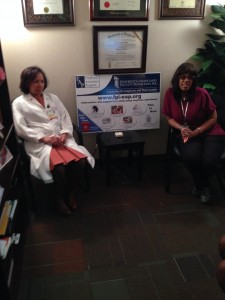
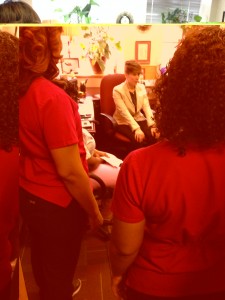
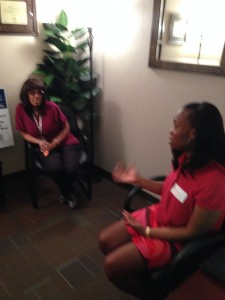
>

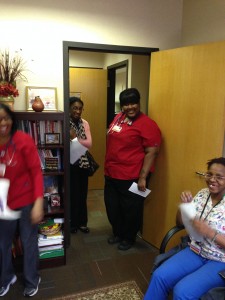
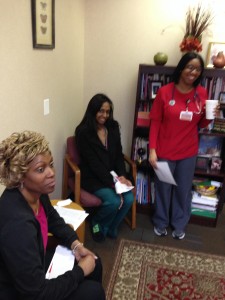
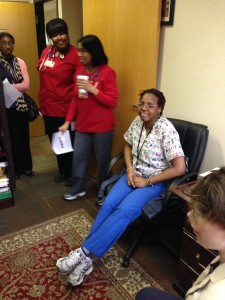
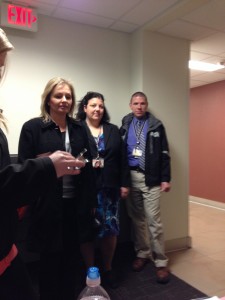
Do You Want a Promotion?
A study in Canada revealed that employees who used their Employee Assistance Program (EAP) were 73% MORE likely to get a promotion than those who did not use the EAP. The study included 6500 women and over 8300 men. One of the theories as to why this helps employees get promoted is that individuals are able to increase their coping skills so they can better handle the job and life in general. Every little bit helps! Contact us today for new coping skills. 410.328.5860
Attend EAP Open House for FPI Employees
Please come join us and learn what the EAP has to offer
Tuesday April 1st from 11:00 – 1:00.
419 W. Redwood St. Suite 560
Meet EAP staff. Get FREE lunch! Raffle for FREE Kindle. Tour the office. Door prizes and more!
Contact Sue Walker at 410-328-5860 or swalker@psych.maryland.edu for more information.
Do You Want a Promotion?
A study in Canada revealed that employees who used their Employee Assistance Program (EAP) were 73% MORE likely to get a promotion than those who did not use the EAP. The study included 6500 women and over 8300 men. One of the theories as to why this helps employees get promoted is that individuals are able to increase their coping skills so they can better handle the job and life in general. Every little bit helps! Contact us today for new coping skills. 410.328.5860
In one week, FPI-EAP will host its first OPEN HOUSE
Come one, come all to the first EAP Open House. Tuesday, April 1 in the EAP suite, 560 in the Professional Building at Paca and Redwood streets.
11:00-1:00, food, games and prizes.
More details to follow. Stay tuned.
 Click to Call
Click to Call
